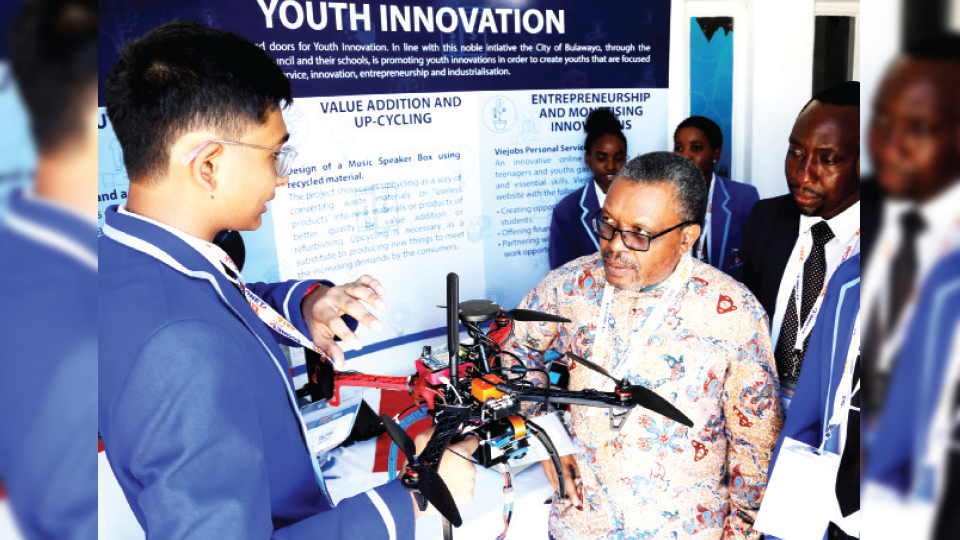Mat South sewer systems condemned


The Plumtree Town Council Engineer, Melusi Ncube, explains how the Plumtree sewer treatment plant works during a media tour of the rehabilitated sewer system organised by the Environmental Management Agency yesterday
Sukulwenkosi Dube Plumtree Correspondent
THE Environmental Management Agency has condemned sewer systems at most institutions in Matabeleland South Province, blaming them for contaminating water sources.
In an interview after a media tour of the rehabilitated Plumtree sewer system, the agency’s environmental education and publicity officer for the province, Sithembokuhle Moyo, said institutions had to upgrade their systems which have obsolete pipes.
She said the province was constantly experiencing sewer bursts and blockages causing contamination of water sources.
Moyo said local authorities had to properly manage their towns’ sewer systems while institutions had to upgrade their sewer pipes to meet standards set by the agency.
“Our main worry is that once institutions and councils continue using these sewer systems that have old pipelines then we will continue to experience pipe bursts.
“This will pose a threat to underground and surface water sources especially during the rainy season as effluent is washed downstream. We will also continuously experience an outbreak of waterborne diseases because these bursts and blockages occur within the community,” said Moyo.
She said towns and institutions were growing and there was a need for the sewer system infrastructure to also expand.
“Old pipes have to be replaced with new ones that can withstand flows,” said Moyo.
The EMA provincial spokesperson applauded Plumtree Town Council for upgrading the town’s sewer system following an instruction from the environmental agency.
She said the town had been declared a red zone because of its poor sewer system.
“The town was instructed to upgrade its system as it was not meeting the standards which were set by the agency and we are relieved that the council has made a lot of progress in that regard. It has moved from the red zone,” she said.
The Plumtree Town Council Engineer, Melusi Ncube, said the local authority had replaced a 2,5km sewer pipe line within the town and was working on a 800m line all valued at $32,000.
He said they had also managed to rehabilitate two sewer ponds which were not working previously at a cost of $14,000.
Eng Ncube said they had replaced the previous 160mm wide pipes with larger PVC pipes.
“We were using poor material pipes which were smaller in diameter but now we have replaced them with 315mm sewer pipes. The pipes were continuously bursting because they were not able to withstand the pressure of flows.
“The town had also grown but we were still using the same old pipes which meant that they were conveying increased sewer flows than before,” he said.
Eng Ncube said the sewer ponds in Plumtree were emitting hazardous waste to the environment as raw sewer before the rehabilitation of the two sewer ponds.
Plumtree Town Secretary, Davis Dumezweni Luthe, said they were conducting sensitisation programmes within the town to ensure that residents did not emit damaging materials into the sewer lines.
He said they were working on erecting a perimeter fence around the town’s sewer treatment plant to secure the ponds.
Luthe also said they would be introducing a biogas programme next year in order to make use of the discharge from sewer ponds.
EMA Environmental Technician for Matabeleland South Samson Nyimai said the bulk of institutions within the province had been classified under the yellow and red zone meaning their waste disposal did not meet the required standards.
Nyimai said Gwanda Town was still in the red zone as it was the town which was causing the most pollution to the environment from its sewer waste. He said the Matabeleland South capital’s sewer system was discharging raw sewer into Manzamnyama River which feeds into Mtshabezi Dam.
“We expect the discharge being emitted into the environment to be properly treated so that it does not become hazardous. This is, however, not the case as most of the waste discharged into the environment is either extremely harmful to the environment or slightly hazardous,” he said.
The touring group included journalists from various media organisations, Plumtree Town Council officials and Environmental Management Agency officials.











Comments